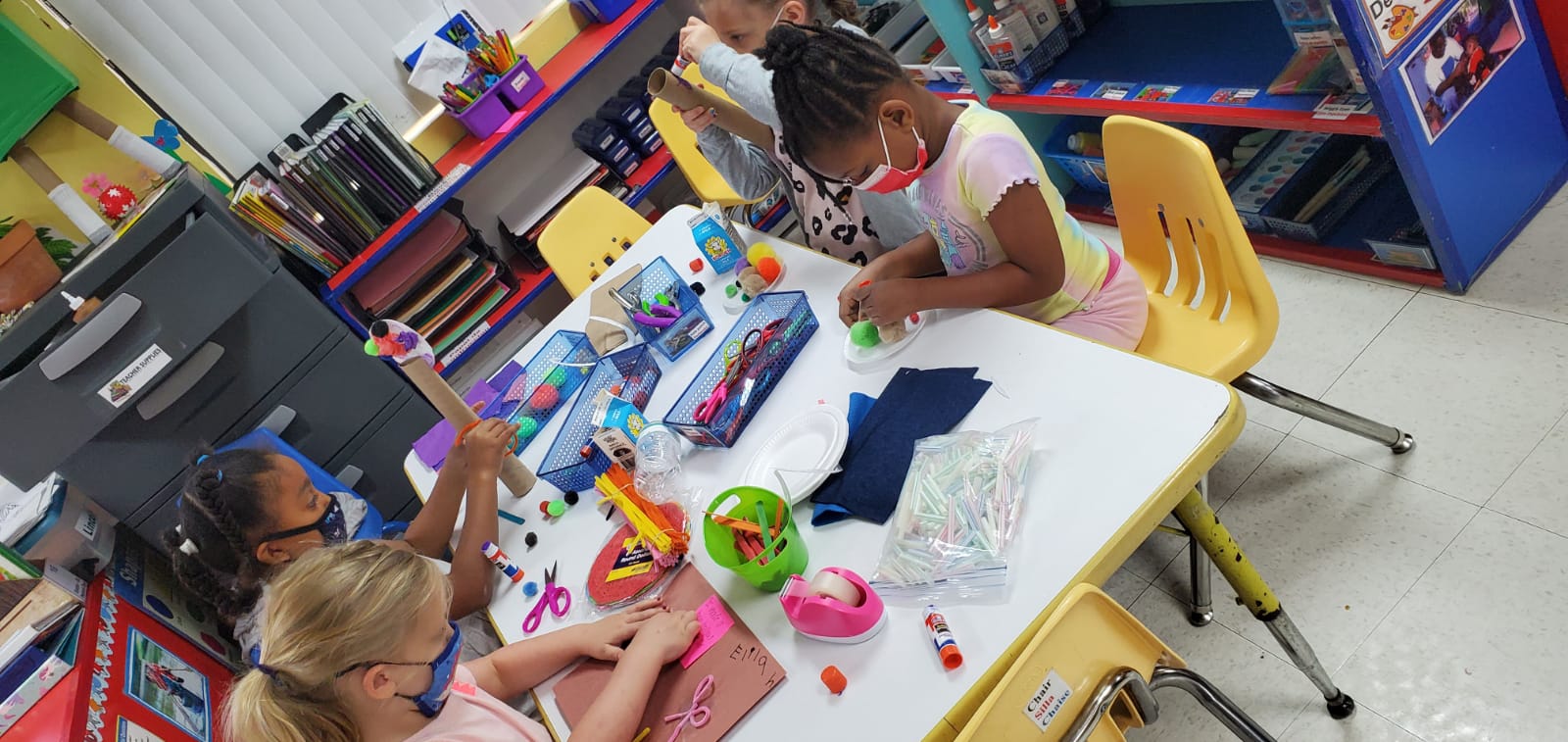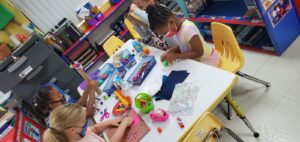Preschool is a big step and an exciting milestone for both toddlers and parents, especially the first day is always filled with a lot of emotions – anticipation, nervousness, and perhaps a touch of sadness as you watch your little one take their first steps towards independence.
At CLE we know that preparing our children for preschool is crucial to lay a strong foundation for their whole educational journey, but don’t worry, we are here to be with you and your child on every step of this new and beautiful chapter of your lives.
On this blog, we’ll explore all the ways to prepare your little one for a smooth and successful first day of class in our preschool in Lake Worth.
What skills do kids need for preschool?
Preschool is a moment in children’s lives when they start gaining independence and exploring the world spending a part of their days in a space that isn’t home. Toddlers must develop certain skills to ensure a good transition and overall experience in preschool, here are some of the most important:
Self-care skills: Before starting preschool, your toddler should know how to dress, pick up their toys, eat their lunchbox, and communicate basic needs, so make sure to practice these skills daily at home.
Potty training and personal hygiene: Most preschools require children to know how to use the toilet on their own. It is also good that they know to blog their nose, wash their hands, and eat without messing themselves.
Be away from the parents: One of the most challenging aspects of preschool for children is being separated from their parents, and separation anxiety is more common than you would think. This is why it is essential to practice this leaving them with other trusted caregivers for longer periods at a time until they are comfortable with being away from you. When preschool is about to begin, explain to your child where you will be while they’re in school, what time you will pick them up, and any other thing that will make them feel less anxious.
Communication: Being able to verbalize their needs, ideas, and desires is a skill that your child will use for the rest of their life. Practice this by asking questions to your toffler and communicating your own needs and thoughts.
Social skills: Preschool is a place for learning to be around other kids and sharing things and experiences with them, and this could be a little challenging for some toddlers. Developing social skills is crucial for children, so it is important to practice this since they’re babies. Take your toddler on playdates or places where they can interact with other children, this way they will be comfortable with sharing, taking turns, and so much more.
Getting ready for the first day of preschool checklist
To make the first day smoother and easier, the preparation should start before school begins. One good piece of advice to improve this experience for children is to allow them to be as involved as possible so they feel familiarized and comfortable with the idea of going to preschool.
A month before starting preschool
- Your child will need a backpack, school supplies, and some other items to use at preschool, so an excellent idea is to give them the option to choose a backpack they like or supplies with their favorite colors or characters. This will give your child a sense of control and grow the anticipation and excitement to use their new things at school.
- Visit your pediatrician for a before-school checkup and make sure all the vaccines are up to date. If your child needs to take special medication or has asthma or allergies, you must fill out some forms with the treatment details and give the medicines to the teacher.
- Establish a preschool schedule or daily routine that is similar to what your child will experience once preschool starts. This includes waking up, having breakfast, and brushing their teeth in the morning, having lunch at around the time they will do it at school, and choosing a good bedtime so they can sleep the proper amount of hours.
- The whole family should encourage the feeling of excitement for the first day of preschool, without making them feel overwhelmed. As this is a new experience for your children, is important that they understand that it is a good change and they will have a lot of fun and good experiences.
The day before preschool
- Allow your toddler to choose the clothes and shoes they want to wear on their first day, always making sure they are appropriate, of course.
- Take the time to ask them questions about how they feel about going to school and answer any question your child could have.
- Pack the backpack with your child the night before, this will save you a lot of time in the morning.
- Take your child to bed early so they can have a good night of sleep. Having an established bedtime routine will make this easier.
The first-day-of-preschool morning
- Wake up your child early enough so they can get ready and have breakfast without a rush.
- Explain the school routine to your child like, what they are going to do, what time you will pick them up, etc.
- When taking your child to preschool, go and explore the classroom with them, introduce them to the teacher, and say hello to the other kids until they are comfortable to stay. Be positive and transmit that to your kid, we know that the first day is also a new experience for you as parents.
Get ready for this school year by enrolling your child at CLE. Don’t miss out on this opportunity to give your child the gift of a quality early childhood education. Contact us now to schedule a tour and learn more about our programs.
Activities to prepare for preschool
Here are some activities that you can do at home to help prepare your toddler for preschool.
Read books about preschool
Reading age-appropriate books about preschool can help your toddler familiarize themselves with the concept of school, understand what to expect, and even identify with characters who are going through similar experiences.
Look for books that explore themes such as making new friends, learning ABCs and numbers, and navigating daily routines like circle time and snack breaks. Not only does reading together foster a love for learning, but it also provides an excellent opportunity for bonding and open discussions about your child’s feelings and expectations regarding preschool.
Practice self-care skills with games
Teaching your child basic self-care routines, such as dressing themselves, using the toilet independently, and washing their hands, not only builds their confidence but also equips them with essential life skills for preschool and beyond. Turn everyday tasks into fun games by setting up a dress-up station with clothes they can easily manage or create a pretend play “bathroom” complete with a toy toilet and sink for practicing bathroom routines. By making self-care activities enjoyable and interactive, you’ll instill healthy habits while sparking your child’s curiosity and independence.
Visit the new preschool with your child before school begins
One of the most effective ways to ease your toddler’s transition to preschool is by familiarizing them with the new environment beforehand. Schedule a visit to the preschool with your child before their first day, allowing them to explore the classrooms, playground, and other facilities at their own pace.
Encourage them to interact with teachers and other children, ask questions, and express any concerns they may have. This pre-visit helps them to know the preschool experience, making the actual first day feel less intimidating and more exciting. Also, it provides an opportunity for you to observe your child’s reactions and address any apprehensions or curiosities they may have, ensuring a smoother transition when the big day arrives.
Is your child having trouble adjusting to preschool?
It is normal for children to have a hard time as they adapt to the new environment, routines, and social dynamics of preschool. It’s essential to recognize signs that your child may be having difficulty adjusting and to provide support and guidance to help them navigate this transition with confidence.
Identifying signs of difficulty
It’s normal for toddlers to experience some degree of anxiety or hesitation when starting preschool, but if these signs persist after a while it may be adjustment issues. Common signs that your child may be struggling to adjust to preschool include:
- Excessive clinginess and crying at dropoff
- Refusal to participate in group activities or interact with other children
- Constant tantrums, or regression in behavior
- Complaints of physical symptoms such as stomachaches or headaches
- Difficulty sleeping or changes in eating habits
Supporting Your Child
There are several strategies you can use to provide support and encouragement to your toddler so they adjust to preschool, for example:
- Create a safe space for your child to express their feelings and concerns about preschool.
- Establish a regular morning routine and bedtime schedule to help your child feel secure.
- Celebrate small victories and accomplishments to boost your child’s confidence and self-esteem.
How does Creative Learning Experience help toddlers adjust?
At CLE we understand that every child is unique and they all have their process to adapt to their new school and routine. Through personalized attention, engaging activities, and thoughtful guidance, we help children navigate the challenges of adjusting to preschool with confidence and enthusiasm.
We provide:
- Individual attention and care: Our dedicated team of teachers takes the time to get to know each child, understanding their needs and preferences. Through this personalized approach, we create a supportive and inclusive environment where every child feels valued, understood, and empowered to thrive.
- Collaborative partnership with parents: We understand that parents play a crucial role in supporting their child’s adaptation to preschool. That’s why we foster open communication and collaboration between parents and our team of professionals.
- Adaptable programs:.At CLE we offer two Pre-Kindergarten programs for 4-5 year-old children, a full-time and part-time enrollment. The part-time option is free and a great option for children to adapt to the school routine.
Our purpose is to benefit the child, the parents, and the community by providing a child development-appropriate program where creativity and personality can blossom. We are dedicated to helping each child adapt to preschool with confidence, resilience, and joy. If your toddler is getting closer to the age of starting preschool, contact us so they can live this great experience at CLE.
FAQs
How do I know If my child is ready for preschool?
While age is an important factor, a child who is sociable, comfortable around other kids, and can be separated from their parents for some hours without excessive crying or anxiety is probably ready to start preschool.
What age is best to start preschool?
Most schools and child experts consider that 4 years old is the appropriate age to start preschool. But remember that every child is unique, so for some, it could be earlier or a little later.
How long does it take for a toddler to adjust to preschool?
It usually takes a couple of weeks for a child to adapt to a new environment such as preschool or daycare. The time depends completely on the child, their previous experiences, and skills, it is totally normal if it takes more time, but if after six weeks the kid still shows anxiety and discomfort it would be best to seek expert advice.
What does my child need to take to preschool?
Every preschool provides a list of supplies and items the kids should have, it includes a backpack, a lunch box, a blanket and nap mat (if the program includes naps), a water bottle, extra clothes, shoes, and underwear, art supplies and comfort items like a stuffed animal,
Are vaccines required for preschool?
Yes, most preschools require children to have their vaccines on time. 4 to 5-year-old children should receive vaccines to protect them from: influenza (flu), chickenpox (Varicella), measles, mumps, rubella, polio, diphtheria, tetanus, and whooping cough (pertussis).




